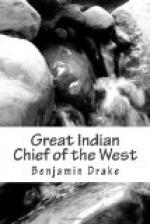“In the poem of Ontwa, a scene like this is so well described, that we cannot resist the temptation to transfer it to our pages. Of all who have attempted to embody in song, the “living manners” of the Indians, the anonymous author of that poem has been the most successful. His characters, and traditions and descriptions, have the spirit and bearing of life; and the whole work, is not less true to nature than to poetry.
A hundred warriors now advance,
All dressed and painted for the dance;
And sounding club and hollow skin
A slow and measured time begin:
With rigid limb and sliding foot,
And murmurs low the time to suit;
Forever varying with the sound,
The circling band moves round and round.
Now slowly rise the swelling notes
When every crest more lively floats;
Now tossed on high with gesture proud,
Then lowly mid the circle bow’d;
While clanging arms grow louder still,
And every voice becomes more shrill;
Till fierce and strong the clamor grows,
And the wild war whoop bids it close.
Then starts Skunktonga forth, whose band
Came from far Huron’s storm-beat
strand,
And thus recounts his battle feats,
While his dark club the measure beats.”
Major Long of the U.S. army, in his Expedition up the Missouri, gives an account of a council which he held, at Council Bluff, with a party of one hundred Ottoes, seventy Missouries, and fifty or sixty Soways. The Otto nation is known by the name of Wah-toh-ta-na. Their principal village is situated on the river Platte, about forty miles above its junction with the Missouri. At the period of this visit, these Indians had held little if any intercourse with the whites. After the council was over, they performed a dance, in honor of their visitors, the description of which will convey to the reader a very vivid picture of this ceremony. We give it, in Major Long’s own words.




